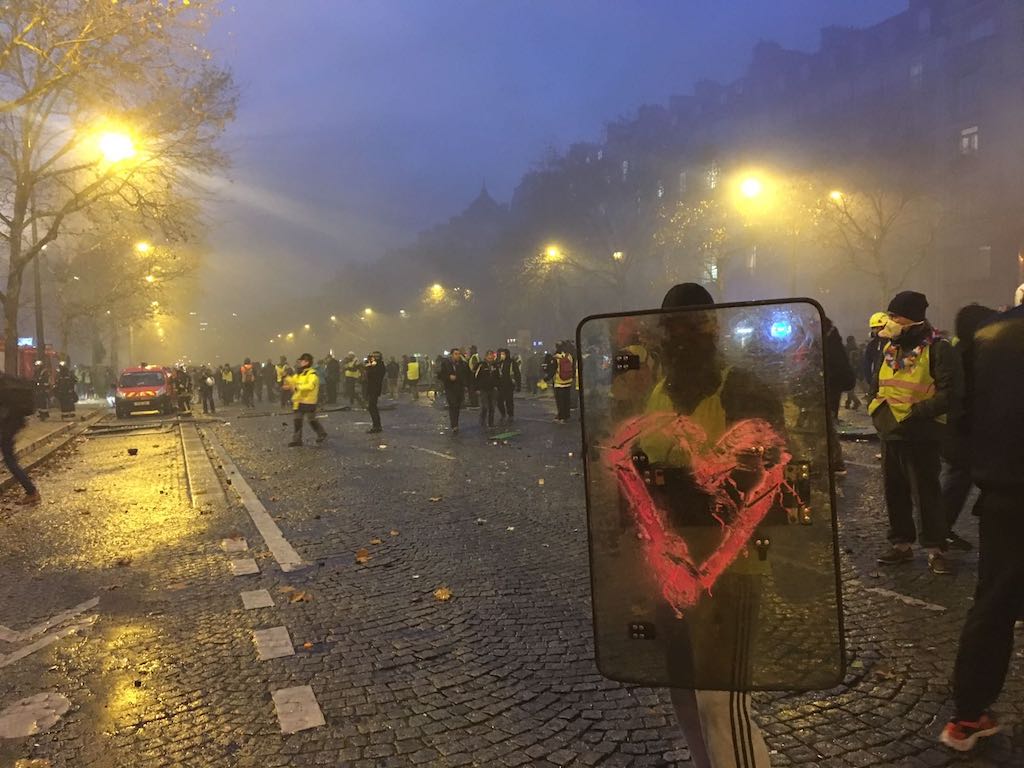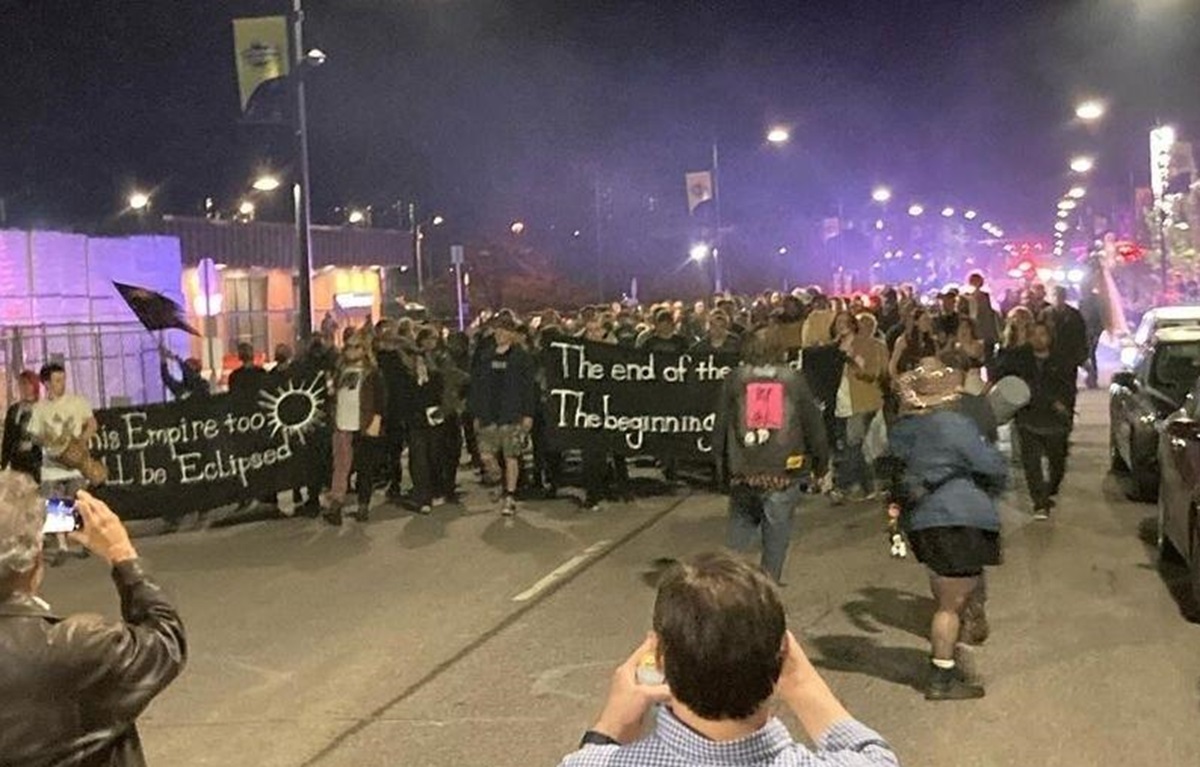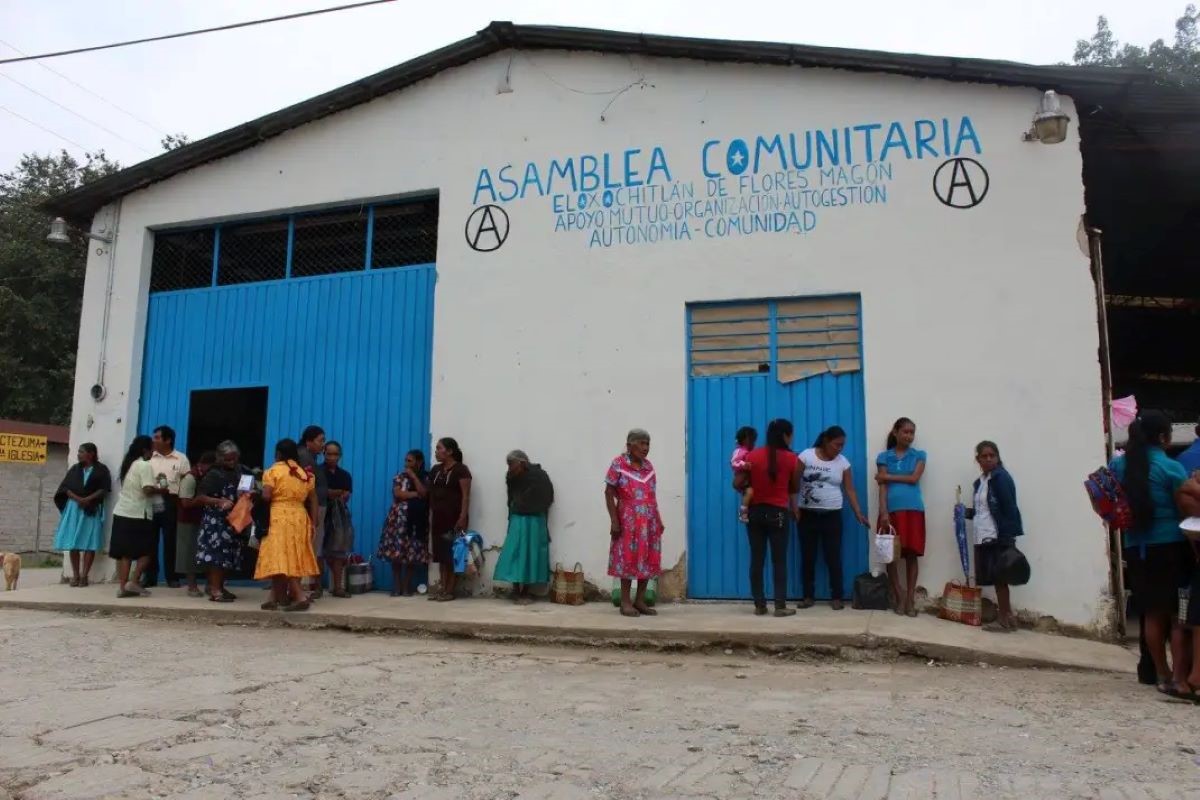Filed under: Analysis, International Coverage

Here’s a translation of a text published by French comrades on the Carbure Blog, about the yellow vest movement. For other translations, check out Ediciones Ineditos.
On Saturday, December 1, the Yellow Vests movement ceased to belong to itself, it ceased to be the white France movement from below that it was at its beginning. Faced with the foreseeable refusal of the State to satisfy the slightest claim (as attested by the refusal or inability of the “spokespersons” of the movement to meet the Prime Minister), with the derisory aspect that any claim takes on in view of the unbearable existences that we have, and thanks to the convergence in the urban environment of ALL angers, the revolutionary content of the current period has begun to appear under the crust of speeches and ideologies, and this content is chaos. The question now is where what started will stop, or rather how far what started here will carry the disorder. Already, those at the origin of the movement are acting as a pushy rearguard of what they have initiated, appealing to reason and demanding in the JDD [1] the return to republican order. They are the embodiment of the movement in its early days, and their timidity shows enough what this movement is already no longer. They would be satisfied with a moratorium on fuel prices, with any increase in anything or with the organization of a referendum on the energy transition, where a movement is taking shape that wants to take everything with it, and no longer manages to crystallize on any speech or claim, except “Macron resignation,” repeated as a kind of mantra by calling for the void, for the disappearance of everything that represents this world. “Macron resignation” is both the political limit of this movement, and the call to the end of any policy.
In the face of what happened on Saturday, December 1, it would be absurd to continue to describe what is happening as a “movement against the high cost of living”, to make up as an economic claim, which obviously goes much further. On Saturday, the “complaint books” were used to start fires. The Yellow Vest movement had already moved beyond this stage of economic claim in the first week, to enter its populist political phase, to demand that the state withdraw before the people or that the people become a state. We criticized this phase and determined the content of the demands made by white France below in its class mediation, showed the limits of this interclassism, pointed out the danger of the national popular unity of some against others. We had barely finished criticizing this phase when we were no longer there.
This movement lacked a dose of nihilism to give meaning to its “apolitism”: the encounter with the “neighbourhoods” provided it with what it lacked to correspond to the “real movement”, which is not that of social progress but that of the destruction of society, and to joyfully recognize itself as home. Interclassism has turned into a tension of unity, between all those who know clearly or confusedly that they have nothing to expect from this society, whether they are relegated to the districts, shipwrecked by the peri-urban pavilion nightmare or RSAists [2] who survive by picking chestnuts in the Ardèche. It was necessary to see the army of the dead of the trade union procession passing through the Place de la Bastille [3], hidden behind its flags and slogans, affirming the particularity of work as a workers’ movement, and to feel the total indifference of those who, in yellow vests or not, walked aimlessly but together in Paris, to understand how much the old workers’ movement, its unions, its representatives and its demands are a thing of the past. There will be no “social convergence”, this movement has not returned to the reason of the left, it will never be a social movement. This time is over. It is no longer a question of anti-racism or antifascism, left or right, when it is only a question of burning everything, and knowing with whom we can do it. This state of affairs carries both civil war as a limit and revolutionary overcoming: to take the step from insurrection to revolution is to walk on the blade of a sword.
This meeting has taken place, but it remains to be seen whether it can be repeated and extended. Everything that can oppose it is already there, present in the “social” nature of the movement as well as in the social relations themselves, which no riot can abolish: the unifying slogan “Macron resignation” contains in hollow the possibility of a national-populist alliance taking state power in the name of the people (Le Pen and Mélenchon calling with one vote for early elections), and offering the state an adequate form to the crisis: a compassionate-authoritarian form, capable of bringing everyone into line, assigning some to otherness, and symmetrically assigning others to responsibility and patriotism, crushing each other in each other’s name to dominate everyone. We have seen it ten times in recent years: Que se vayan todos is often a call to renew, for the worst, the political staff. But to get there, it will be necessary to reassign white France from below to itself, to put it in its place, under the direction of the middle classes, honest work paid its fair price and harmonious trade circulation. This is the only way out of the crisis that is currently conceivable, unless the Macron government addresses this authoritarian shift on its own.
To avoid this, it will be necessary to take the disorder further. The time of the urban riot is in itself a limit to what is currently happening: historically, it responds to two modalities, which are either the seizure of state power or its crisis to push it to concessions. But this is not 1917, no takeover of state power to achieve a socialist programme is conceivable, and this is not 1968, there will be no Grenelle agreements. To stick to the urban riot is to stick to what the movement still has in politics. But if what manifested itself on Saturday in Paris and all over France returns to the roadblocks, creates new ones and sets out to truly “block the country”, i.e. to seize it, and decide from there on its future, we can imagine going from riot or uprising to revolution. But no one can say which direction what is happening now will take, which is running faster than everyone else: there is no better mark of the revolutionary content of what is happening there. This movement, because it is class struggle, carries everything that a communist revolution can be today, its limits, its dangers, its unpredictability: but to get there, many of these things that stand between us, whether cars or social relations, will probably have to burn again.
[1] The JDD is a french newspaper.
[2] The RSA, “Revenu de solidarité active”, is a pension given by the state to the poorest.
[3] The same day was organized a march by labor unions against precarity.





